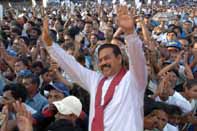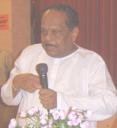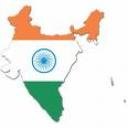 There is nothing that our enemy, the Tiger international network and the pro-Tiger, pro-Tamil Eelam Tamil Diaspora would like better, than to see a gap open up in the partnership between Sri Lanka and India; a gap that they will seek to manipulate in consonance with their Western patrons and friends. The non-implementation of the 13th amendment will open up such a gap. The implementation of the 13th amendment is not a give away or dilution of our military gains. It is the necessary political accompaniment of them and the guarantee of the consolidation of our military victory. It is in our national interests and a guarantee of our national security.
There is nothing that our enemy, the Tiger international network and the pro-Tiger, pro-Tamil Eelam Tamil Diaspora would like better, than to see a gap open up in the partnership between Sri Lanka and India; a gap that they will seek to manipulate in consonance with their Western patrons and friends. The non-implementation of the 13th amendment will open up such a gap. The implementation of the 13th amendment is not a give away or dilution of our military gains. It is the necessary political accompaniment of them and the guarantee of the consolidation of our military victory. It is in our national interests and a guarantee of our national security.
One of the silliest arguments against the implementation of the 13th amendment is that it is a stepping stone to or somehow related to the Tamil separatist cause. If that were the case, Prabhakaran would have accepted it, not rejected it and gone to war against the Indian Peace-keeping Force, damaging his relations with India and culminating in the assassination of Rajiv Gandhi, an atrocious crime for which he paid this May. At the very least he would have abandoned or suspended the war against the IPKF that he began in October 1987 and negotiated for privileged entry into the provincial council. Prabhakaran took a grave risk and waged this war, his second war, precisely because he knew that provincial autonomy as envisaged in the Indo-Lanka Accord and contained in the 13th amendment a year later, was a death trap for Tamil secessionism. This is because authentic moderate reform is a death trap for extremism anywhere, anytime.
Why compromise on the basis of the 13th amendment, ask the extremists on both sides of the ethnic divide. The answer is that anything else would be too risky. Open up the issue again and the Sinhalese may offer less, the Tamils may ask for more and the world may see an even more divided island.
There are two types of people who assert that President Mahinda Rajapakse is against the 13th amendment or does not intend to or will not implement it. These are the Tamil ultranationalists, the Tamil hawks and their fellow-traveling Sinhala doves, who say that no devolution will emanate from the Rajapakse administration, and the Sinhala hardliners who oppose any kind of devolution and attempt to use President Rajapakse’s patriotic profile behind which to hide their extremism. Some even invoke Mahinda Chinthana, oblivious to the irony that Mahinda Rajapakse can be safely trusted to know the letter and spirit of Mahinda Chinthana better than anyone else.
The position of the President and Government of Sri Lanka on the 13th amendment is clearly set out in two contemporary documents, namely the joint statements of May 21st and 23rd issued at the conclusion of the visits of the high level Indian delegation and that of the UN Secretary General respectively. Both statements reiterated the Government’s commitment – indeed one referred to the President’s “firm resolve”— to implement the 13th amendment. Both statements also indicated a political dialogue which would explore further possibilities. I quote:
“Both sides also emphasized the urgent necessity of arriving at a lasting political settlement in Sri Lanka. Towards this end, the Government of Sri Lanka indicated that it will proceed with implementation of the 13th Amendment. …Further, the Government of Sri Lanka also intends to begin a broader dialogue with all parties including, the Tamil parties in the new circumstances, for further enhancement of political arrangements to bring about lasting peace and reconciliation in Sri Lanka.” (May 21, 2009)
“President Rajapaksa expressed his firm resolve to proceed with the implementation of the 13th Amendment, as well as to begin a broader dialogue with all parties, including the Tamil parties in the new circumstances, to further enhance this process and to bring about lasting peace and development in Sri Lanka”. (May 23, 2009)
The statements carried in the Indian media following the reciprocal recent visit of a top level Sri Lankan delegation to New Delhi shed light on what GOSL means by going beyond the 13th amendment. Mention had been made of a second chamber which would contain and represent the provinces. The somewhat less authoritative APRC has also been the source of some newspaper reports of another possibility of movement beyond the 13th amendment by means of a restructuring of the concurrent list of powers held conjointly by the centre and the provinces. Since this is speculative at the moment, it need not detain us further.
The confusion arises over three qualifying terms: “full” or “fully”, “minus” and “plus”, as in full implementation of the 13th amendment or not; 13th amendment minus or 13th amendment plus. What is forgotten is that we are already at 13th amendment minus and is likely to remain minus in that specific respect, namely the de-merger of the North and East. So even if we upgrade the 13th amendment in certain respects (second chamber, reduced concurrent list), it will never be an unambiguous plus. It will be plus something, minus merger.
This leaves the issue of the full implementation of the 13th amendment. Here too, the question does not arise in one sense because the de-merger has taken place and what would be implemented is not the 13th amendment in full. The discussion, to be frank, is about two other matters: police powers and land. Here too the fuss is less than warranted. Even Minister Muralidharan has said that the devolution of police powers is not a matter of urgency and Minister Devananda has made matters even simpler by saying that all he wants as an immediate step is for the Northern Province to enjoy the exact same powers as have been devolved to the other Provincial Councils in the island.
Therefore we do not have to agitate our society with the issue of Police powers at this moment.
However the issue will not go away, and should be addressed in the interests of national security. It is one thing for an almost totally mono-ethnic military to defeat an equally mono-ethnic enemy militia in mid to high intensity warfare. It is another for a mono-ethnic military to maintain a necessary long term large scale presence in a territory almost totally inhabited by a different and disaffected ethnic community, without the benefit of a local, or should I say “home grown” intermediary. Unless and until it becomes ethnically integrated and representative of the island’s demographics as a whole, the Sri Lankan military must not be drawn into and bogged down in policing functions which bring them into possible relations of contradiction with the local inhabitants. Some commentators have upheld as example India’s military cantonments, forgetting that India’s is a highly multiethnic military at all levels. It is therefore in the interests of the Sri Lankan military to have a local intermediary or auxiliary force and it is equally necessary that this force work with accountability and discipline, within a regulatory framework.
The next issue is that of land, which is at the heart of most ethnic and civic conflicts. The land provisions of the 13th amendment were carefully worked out by India and Sri Lanka, as Dr Sarath Amunugama for one will testify – and it may be less than prudent to seek to unilaterally roll back that understanding.
Historically this is the best time to effect a political reconciliation between the Sinhala and Tamil communities in Sri Lanka. If we do not do so internally, space opens for external interference. If a minority anywhere in the world remains disaffected and domestic reconciliation is not forthcoming it is natural that it would look to co-ethnics elsewhere and to outside powers for support. Today is the best time to draw or re-draw our political contract in a way that brings us together. The Sri Lankan armed forces have reunited the entire territory of the island. The Tamil extremists are weakened to an unprecedented extent by the destruction of their vanguard the LTTE. They can no longer sustain hard-line positions. President Rajapakse has the trust of the Sinhalese to a degree that none of his predecessors had, thanks to his leadership of the liberation war against terrorism and separatism. He can therefore carry the Sinhalese with him into a settlement of the underlying and pre-existing issues. Thus this is the best time for a moderate compromise.
(These are the strictly personal views of the writer).
(Courtesy The Island July 02 2009)
Related Articles:
இலங்கை – இந்திய ஒப்பந்தம்: முத்தரப்புத் தோல்வி : த ஜெயபாலன்
வடக்கு – கிழக்கும் 13வது திருத்தமும் அரசியல் கலந்துரையாடல் : த ஜெயபாலன்
‘வடக்கு கிழக்கும் 13வது திருத்தச்சட்டமும்’ பன்முகப் பார்வை – தொகுப்பு : த ஜெயபாலன்
13வது திருத்தத்தைக் காட்டிலும் இடைக்கால தன்னாட்சி அதிகார சபை ஏன் பொருத்தமற்றது : வி. சிவலிங்கம்
அரசியற் பொருளாதாரமும் 13ம் சட்ட சீர்திருத்தமும் : ரவி சுந்தரலிங்கம், Academic Secretary, ASATiC











